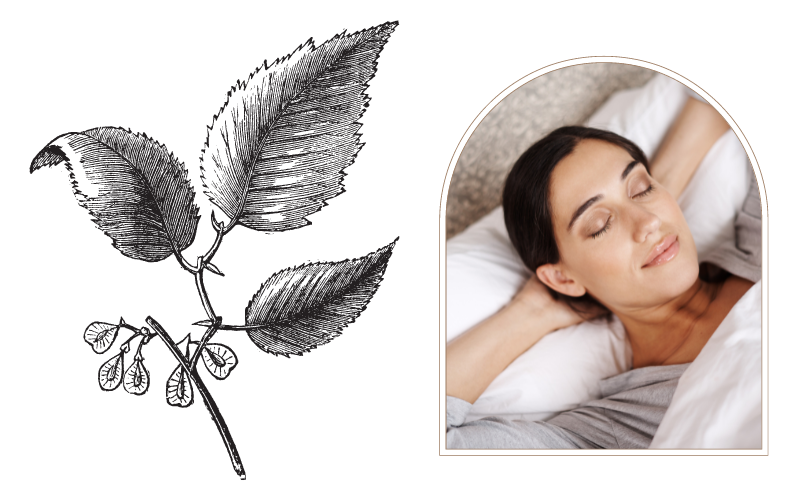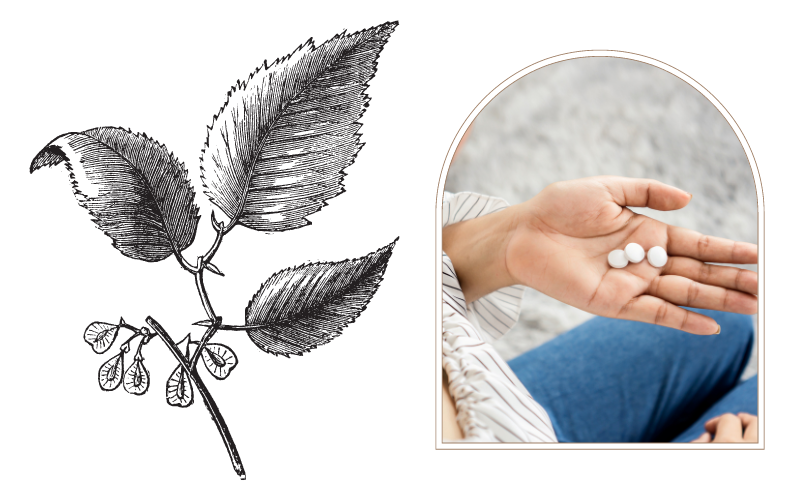Slippery elm, scientifically known as Ulmus rubra, is a type of elm native to North America. It’s known for its inner bark which, when mixed with water, becomes slimy and slightly aromatic, hence the name ‘slippery elm’. This unique property has made it a popular ingredient in various herbal remedies for centuries.
People have used it to treat a variety of conditions, from sore throats and swollen glands to stomach ulcers. But what happens when you consume slippery elm before bed? This article aims to explore that question and delve into the effects on the body.
However, it’s important to remember that while slippery elm has been used as a natural remedy for a long time, it’s always crucial to consult with your healthcare provider before incorporating any new supplement or food into your routine. This is because some supplements and foods can interfere with medications or cause allergic reactions, and only a healthcare provider can provide advice tailored to your specific health situation.
Now, let’s dive into the world of potential effects on your body when it’s consumed before bedtime.
Effects
The inner bark of slippery elm is dried and then powdered before usage. It can then be applied to the body in many ways. It can be taken by mouth as tablets or applied to the skin as powders, lip balms, etc.
Native Americans were the first to discover the usage of slippery elm bark. They mainly used it as material to build their homes and create storage baskets, but they also used it to make healing salves to heal wounds and cure infections. American soldiers also used it to heal gunshot wounds during the American Revolution.
Another astonishing thing about slippery elm is its tree. This tree can live for up to 200 years, but most of the benefits are derived from the tree’s inner bark.
While most people use it during the day, what happens when you use it at night?
If you decide to use slippery elm before bed, here are some effects it might have on your body:
1. Better Sleep For Those with a Cough or Sore Throat

A person with a cough or a sore throat will have trouble sleeping and won’t enjoy a good night’s rest because of the pain caused by a sore throat or waking up constantly due to the need to cough.
But using slippery elm might help prevent this. This is a natural demulcent; by coating the lining of the throat with slippery elm, it can be used to cure coughs and soothe sore throats.
2. Skin Irritation

When used by some people can cause skin irritation and allergic reactions. There isn’t enough information to confirm if it is totally safe when applied to the skin.
3. May Help Sleep by Relieving Digestive Disorders

Digestive disorders can hinder one from enjoying a good night’s rest, but the inner bark of slippery elm contains some chemicals that increase mucous secretion.
These secretions might help treat some stomach and intestinal problems. Some advocates of slippery elm also claim that it can ease symptoms of Inflammatory Bowel Disease like ulcerative colitis, and by doing so it can help sufferers get a better sleep.
4. Might Interfere with Usage of Other Medications Like Sleeping Pills

The usage of slippery elm before bed might interfere with other medicine a person uses. That’s because it coats the digestive tract, so the absorption of other medications might be slowed down.
A person that needs to use a sleeping pill before going to sleep will therefore have difficulty sleeping because the slippery elm might have slowed down or made the sleeping pill ineffective.
So you should think twice about using it before bed if you take sleeping pills or other medication that could be effected.
General Effects of Slippery Elm on The Body
There is several essential and potential uses. Below are some of the potential uses of slippery elm and how it may effect your body.
1. Weight Loss

It’s believed that can be used to control a person’s blood sugar level, which can help a person maintain a moderate weight. This could be good for people with obesity or excessive body fat.
However, there is limited evidence to support these claims.
2. Can Be Used to Treat Heartburn and GERD
Heartburn can be treated with slippery elm, but minimally. Gastroesophageal reflux disease, also known as GERD, can also be treated with the mucilage of slippery elm.
GERD occurs when the acid in the stomach flows back into the esophagus, causing some undesirable symptoms. However, slippery elm can be used to prevent the irritation and inflammation that occurs when the acid in the stomach flows into the esophagus.
3. Can Be Used as a Demulcent

It can be applied locally to treat sores, toothaches, and wounds.
Some herbal teas and tablets used to soothe coughs are made with slippery elm because of its demulcent effects.
Side Effects

Generally, slippery elm might seem good for the body and has important uses, but it also has some side effects. Below are a few possible side effects:
1. It Affects Pregnancy and Breastfeeding
When inserted into a pregnant woman’s cervix, can cause a miscarriage. It is also said to be able to cause an abortion even if taken by mouth. So it is better to be on the safe side and steer clear of slippery elm if you are pregnant or breastfeeding.
2. Allergic Reactions
Even though it seems slippery elm is safe for adults to use, some sensitive people might find themselves allergic. Indeed slippery elm ointment can sometimes cause rashes on the skin.
We advise you check with your doctor or any health care professional to get additional medical information about your body’s potential reaction before using it for the first time.
Final Thoughts
Using slippery elm before bed doesn’t have many side effects and may help those with cough, sore throats, or stomach disorders. But most health practitioners would advise using it during the day instead.
Even though slippery elm usage has no general guidelines, it is advisable to take pills or tablet by mouth at least one hour after taking medications. This is because the mucilage present in slippery elm prevents quick absorption of other medications. However before taking it for the first time, consult your doctor on the effects it could have on you.
More research certainly needs to be done regarding the proper dosage of slippery elm, so you should meet with your doctor or health practitioner before using it.

